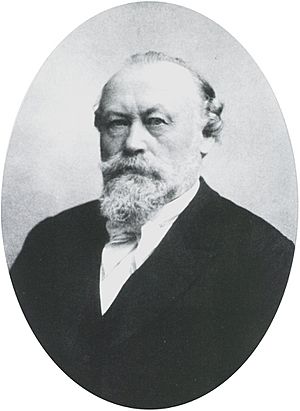Eduard Friedrich Wilhelm Pflüger facts for kids
Eduard Friedrich Wilhelm Pflüger (born June 7, 1829 – died March 16, 1910) was an important German physiologist in the 1800s. A physiologist is a scientist who studies how living things, like our bodies, work.
Life and Discoveries
Eduard Pflüger was born in Hanau, Germany, on June 7, 1829.
He first studied law at Berlin University. But then, he changed his mind and decided to study medicine instead! He also studied at the University of Marburg. He earned his doctorate degree in 1853. While in Berlin, he worked as an assistant to another famous scientist, Emil du Bois-Reymond.
In 1859, Pflüger became a professor of physiology at the University of Bonn. He stayed there for the rest of his career, teaching and doing research. Some of his students, like Nathan Zuntz and Hugo Paul Friedrich Schulz, also became well-known scientists.
Pflüger made many important discoveries in physiology. He studied how bodies work from many angles, including:
- Embryological physiology: How living things develop from tiny beginnings.
- Respiratory physiology: How we breathe and use oxygen.
- Sensory physiology: How our senses (like touch or sight) work.
- Electrophysiology: How electricity plays a role in our bodies, especially in nerves and muscles.
One of his most famous discoveries is called "Pflüger's law." This law explains how electrical signals make our muscles contract or twitch.
In 1868, he started a science journal called Archiv für die gesammte Physiologie des Menschen und der Thiere. This journal, now known as Pflügers Archiv: European Journal of Physiology, became one of the most important physiology journals in Germany.
He also researched many other things, such as:
- Intestinal peristalsis: The wave-like movements that push food through our digestive system.
- The sensory parts of the spinal cord: How our spinal cord helps us feel things.
- Electrotonus: How nerves respond to electrical currents.
- Protein metabolism: How our bodies use and break down proteins.
- How our nervous system controls our body temperature.
One of his most important studies showed that breathing (or respiration) actually happens in the body's tissues, not just in the blood. He also did a lot of research on glycogen, which is how our bodies store sugar for energy. He even invented several tools used in physiology research!
Eduard Pflüger passed away in Bonn on March 16, 1910.
See also
 In Spanish: Eduard Pflüger para niños
In Spanish: Eduard Pflüger para niños
 | Delilah Pierce |
 | Gordon Parks |
 | Augusta Savage |
 | Charles Ethan Porter |


